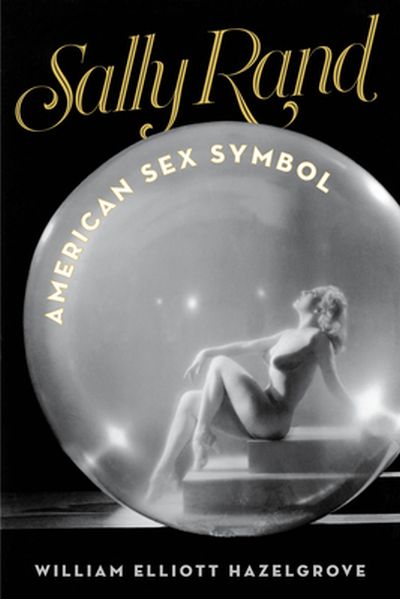
|
| presents
|

|
| |

|
She would appear
in more than thirty films and
be named after a Road Atlas by Cecil
B DeMille. A football play would be
named after her. She would appear on
To Tell the Truth. She would
be arrested six times in one day for
indecency. She would be immortalized
in the final scene of The Right
Stuff, cartoons, popular
culture, and live on as the iconic
symbol of the Chicago World’s Fair
of 1933. She would pave the way for
every sex symbol to follow from
Marilyn Monroe to Lady Gaga. She
would die penniless and in debt. In
the end, Sammy Davis Jr. would write
her a $10,000 check when she had
nothing left.
Her name was Sally Rand.
Until now, there has not been a
biography of Sally Rand. But you can
draw a line from her to Lana Turner,
Marilyn Monroe, Raquel Welch, Ann
Margret, Madonna, and Lady Gaga. She
broke the mold in 1933, by
proclaiming the female body as
something beautiful and taking it
out of the strip club with her
ethereal fan dance. She was a poor
girl from the Ozarks who ran away
with a carnival, then joined the
circus, and finally made it to
Hollywood where Cecil B DeMille set
her on the road to fame with silent
movies. When the talkies came her
career collapsed, and she ended up
in Chicago -- broke, sleeping in
alleys. Two ostrich feathers in a
second-hand store had rescued her
from obscurity.
|
|
|
William
Hazelgrove is the national
bestselling author of ten novels
and eight nonfiction titles.
He has spoken to the Cigar Society
previously about Henry Knox's
Noble Train, the Wright Brothers,
Teddy Roosevelt, Al Capone, and
Woodrow and Edith Wilson. His
books have received starred
reviews in Publisher Weekly,
Kirkus, Booklist, Book of the
Month Selections, ALA Editors
Choice Awards Junior Library Guild
Selections, Literary Guild
Selections, and the History Book
Club Selections. He was the Ernest
Hemingway Writer in Residence
where he wrote in the attic of
Ernest Hemingway’s birthplace. He
has written articles and reviews
for USA Today, The Smithsonian
Magazine, and other publications,
and has been featured on NPR All
Things Considered. The New York
Times, LA Times, Chicago Tribune,
CSPAN, and USA Today have all
covered his books with features.
His books Tobacco Sticks, The
Pitcher, Real Santa, and Madam
President have been optioned
for screen and television rights.
|

|
|
Buy this book.
You can have an autographed and
personally inscribed copy of the book
sent to you directly.
|
|
From Rick Kogan's
review in the Chicago Tribune:
My father—maybe some of your fathers
too—told me stories about the remarkable
things he saw at A Century of Progress,
the world’s fair held on Chicago’s
lakefront in 1933 and 1934.
Of all the “wonders” on display
there, the one that stayed longest in some
minds was that of “fan dancer” Sally Rand,
who pops off the pages the latest
historical excursion by William
Hazelgrove, a local author of boundless
curiosity.
The woman who would be Sally Rand was
born Helen Beck in 1904 in a small
Missouri town tucked in the Ozarks.
Benefiting from music and dance lessons as
a child, as a teenager she ran away and
joined a carnival, graduated to a
traveling circus and eventually made it to
Hollywood.
It was there that film director Cecil
B. DeMille changed her name to Sally Rand
(inspired when he saw a copy of a Rand
McNally atlas) and cast her in more than
two dozen silent films. But the talkies
came along and she was gone, because, as
she told Studs Terkel in a radio interview
decades later, my “voice belongs in the
Eleanor Roosevelt category.”
She then came to Chicago to star in a
play. It lasted only one month. But it was
here, “sleeping under cardboard in the
alleys,” that she got the idea to buy some
ostrich feathers, take off some of her
clothes and get a job dancing at a place
called the Paramount Club, a joint popular
with the city’s gangster set.
A Century of Progress was
scheduled to open within the year and
Hazelgrove does an estimable and exciting
job charting those heady times, from the
inventive way Sally Rand “crashed the
fair” as Lady Godiva to her stunning
success that manifested in massive fame,
huge crowds and piles of money.
Hazelgrove is a sociable historian,
writing in a style closer to breezy
conversation than droning academia, and
not at all reluctant to share his
enthusiasm for his subjects. He has done
this in previous books about such colorful
characters as Teddy Roosevelt, Al Capone,
Edith Wilson and the Wright Brothers.
He has wisely opted to use only the
Rand materials that propel this compelling
story, “to focus on how [her life] played
out in the cultural zeitgeist of America
in the twentieth century. ... [She] lived
large … and was one of the first to become
famous for being famous.”
|
|
FREE and ONLINE
Tuesday, December 8, 2020
5:30-7:00 pm CDT
|
|
Sign
in 5:00-5:30 pm for informal cigar and
cocktail chatter.
The event will be called
to order at 5:30.
There will be a Q&A session following
the lecture. Audience participation is
invited.
The event will conclude at 7 pm.
An optional cocktail party and discussion
will continue after the event.
Be sure to have your cocktails and
cigars at ready hand.

After you register for the event,
look for Order Confirmation email
from Eventbrite.
Scroll to the bottom of the message for a
link to the video conference, and other
instructions.
From the Order Confirmation email you can
also save the event to your online
calendar
and later join the video conference from
the link automatically provided in the
calendar entry.
|
|
|
About the
Cigar Society of Chicago
ONE OF THE OLDEST
AND greatest traditions of the
city clubs of Chicago is the
discussion of intellectual,
social, legal, artistic,
historical, scientific, musical,
theatrical, and philosophical
issues in the company of educated,
bright, and appropriately
provocative individuals, all under
the beneficent influence of
substantial amounts of tobacco and
spirits. The Cigar
Society of Chicago
embraces this tradition and
extends it with its Informal
Smokers, University
Series lectures, and Cigar
Society Dinners, in which
cigars, and from time to time
pipes and cigarettes, appear as an
important component of our version
of the classical symposium.
To be included in the Cigar
Society's mailing list, write to
the secretary at
curtis.tuckey@logicophilosophicus.org
|
|
|
|